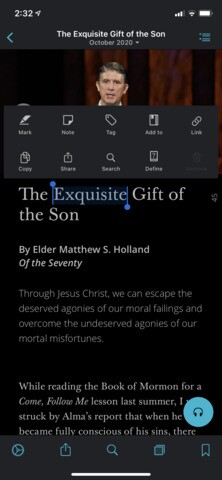Editor's note: This article was originally published on LDS Living in January 2021 as part of a bi-weekly Friday column, “Found in the footnotes,” which explored some of the footnotes from remarks given by General Authorities and General Officers of The Church of Jesus Christ of Latter-day Saints.
In the hours following Elder Matthew S. Holland’s talk in the October 2020 general conference, many of my friends told me how much they loved his address. Some said it was as if having the last name of Holland automatically causes soul-stirring remarks.
One thing both Elder Matthew S. Holland and his father, Elder Jeffrey R. Holland, have in common is the ability to use words in such a way that it conveys a power beyond mere letters strung together. They are masters of the English language and are able to communicate doctrine in beautiful ways.
► You may also like: Have a father and son ever spoken in the same general conference?
Perhaps this is the reason I was excited to discover that, in one of the footnotes of his remarks, Elder Matthew S. Holland gave us an easy way we can also explore the English language.
In his remarks, Elder Matthew S. Holland talks about Alma’s use of the word exquisite.
Alma’s language also stood out to me because the word exquisite, in the English translation of the Book of Mormon, typically describes things of exceptional beauty or unparalleled magnificence. For example, Joseph Smith noted that the angel Moroni wore robes of “exquisite whiteness,” “a whiteness beyond anything earthly [he] had ever seen.” Yet exquisite can also convey an extreme intensity even for awful things. Thus Alma and top dictionaries link exquisite pain to being “tormented,” “racked,” and “harrowed” to the “greatest degree.”
Attached to this paragraph, Elder Holland explains how the Gospel Library app can be utilized to find definitions of words like exquisite:
For instance, compare the explicitly similar language of Alma 36:11–17 with the entry for exquisite in the Oxford American Writer’s Thesaurus—one of several publications that can be loaded in the “Dictionary” section of the general settings on certain devices and thus linked for easy access in the Gospel Library app. Thanks to Rachel Sanford for this reminder.
When I first read this footnote, I filed it away as one I definitely had to look into. I’m constantly amazed at the features unknown to me on my little handheld device. I went to Elder Holland’s talk and highlighted the word Exquisite. Then I clicked the box that says Define in the bottom right of the toolbar that appears. (Note: These screenshots come from an iPhone. Other devices may not have this same feature.)

There, as noted by Elder Holland, were three listings for exquisite, including the Oxford American Writer’s Thesaurus. And in the thesaurus you can see how exquisite can be used to convey intensity in both ways, with words like “beautiful, lovely, magnificent, and wonderful” or “agonizing, harrowing, torturous, insufferable, more than flesh and blood can stand.”

So when Alma describes that his soul was wracked with inexpressible horror, it’s no wonder he later explains “there could be nothing so exquisite and so bitter as were my pains” (Alma 36:21).
Yet, he continues on to say, “There can be nothing so exquisite and sweet as was my joy” (Alma 36:21).
In the same verse, Alma demonstrates two ways this word can be used. And I love that Elder Holland applies those same definitions to what we can experience in our lives based on the choices we make:
He who is without sin suffered “the infinite and unspeakable agony” of every single sin in the universe of His creations, for all of His creations—a suffering so severe, blood oozed out of His every pore. From direct, personal experience the Savior thus warns us, in modern scripture, that we have no idea how “exquisite” our “sufferings” will be if we do not repent.
But if we do choose to access “The Exquisite Gift of the Son,” the results look much different:
I witness to you that through the staggering goodness of Jesus Christ and His infinite Atonement, we can escape the deserved agonies of our moral failings and overcome the undeserved agonies of our mortal misfortunes. Under His direction, your divine destiny will be one of unparalleled magnificence and indescribable joy—a joy so intense and so unique to you, your particular “ashes” will become beauties “beyond anything earthly.” That you might taste this happiness now and be filled with it forever, I invite you to do what Alma did: let your mind catch hold on the exquisite gift of the Son of God as revealed through His gospel in this, His true and living Church.
I hope that as we move beyond the season of gift-giving we remember the exquisite gift of the Son of God—and in Him, we too will experience exquisite joy.
Lead image: Intellectual Reserve, Inc.




